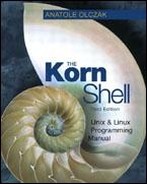Execution
Each time a command is read, the above substitutions are carried out. If the command name matches one of the Special Built-in Commands listed later in this appendix, it is executed within the current shell process. Next, the command name is checked to see if it matches a user defined function. If it does, the positional parameters are saved and then reset to the arguments of the function call. A function is also executed in the current shell process. When the function completes or issues a return, the positional parameter list is restored. For functions defined with the function name syntax, any trap set on EXIT within the function is executed. The exit value of a function is the value of the last command executed. If a command name is not a special built-in command or a user defined function, but it is one of the built-in commands listed later in this section, it is executed in the current shell process.
The shell variable PATH defines the search path for the directory containing the command. Alternative directory names are separated by a colon (:). The default path is /bin:/usr/bin: (specifying /bin, /usr/bin, and the current directory in that order). The current directory can be specified by two or more adjacent colons, or by a colon at the beginning or end of the path list. If the command name contains a /, then the search path is not used. Otherwise, each directory in the path is searched for an executable file that is not a directory. If the shell determines that there is a built-in version of a command corresponding to a given pathname, this built-in is invoked in the current process. A process is created and an attempt is made to execute the command via exec(2). If the file has execute permission but is not an a.out file, it is assumed to be a file containing shell commands. A separate shell is spawned to read it. All non-exported variables are removed in this case. If the shell command file doesn’t have read permission, or if the setuid and/or setgid bits are set on the file, then the shell executes an agent whose job it is to set up the permissions and execute the shell with the shell command file passed down as an open file. A parenthesized command is executed in a sub-shell without removing non-exported variables.
